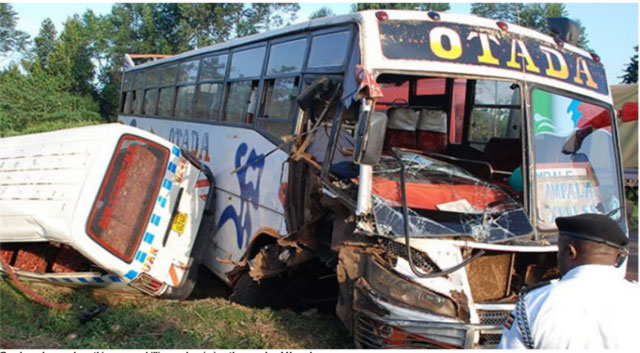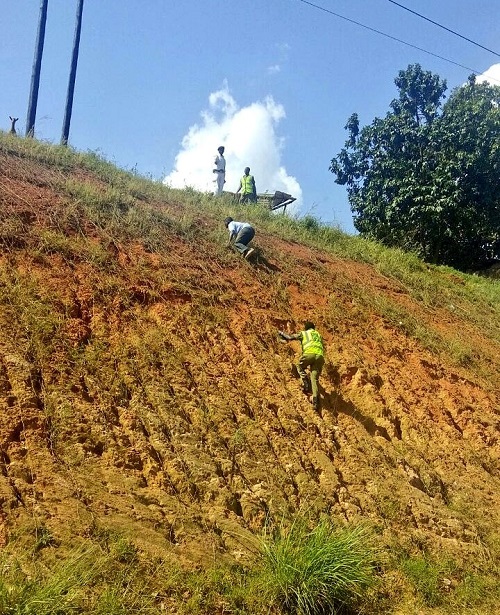
430 people died in road accidents last December. ‘Fika Salama Extra’ launched
News Analysis | RONALD MUSOKE | Minister of Works and Transport, Gen. Edward Katumba Wamala, wants Ugandans travelling to their upcountry homes for the end of year festivities to do so cautiously. He is one of many leaders campaigning against the many road crashes that happen in Uganda during the December Christmas holiday.
Records from the Police’s traffic directorate show most road crashes in Uganda happen in December. In 2020, for example, 1,445 road crashes were recorded in only 31 days translating into 46 road crashes per day.
Katumba and the others do not want that to happen this year.
“Let us plan our journeys, ensure that our vehicles are in proper mechanical condition, drive at appropriate speeds, avoid wrongful overtaking, be courteous to all road users, respect traffic rules and regulations, traffic signs, signals and road markings and exercise the highest discipline while on the road,” Katumba said on Dec.13.
Katumba was at the launch of this year’s Road Safety Week in Kampala. The week which runs in mid-December every year when thousands of Ugandans start trekking to their upcountry homes for Christmas and New Year festivities, was marked under the theme, “Road safety is a shared responsibility.”
Katumba said that lives in Uganda are being wasted yet life is not expendable. He is right to be worried about the ever rising number of road crash victims during the end of the year.
At the launch of the road safety week, the retired Bishop of Mukono; Elia Paul Luzinda Kizito, gave road users; especially motorists, a series of questions to ask themselves before they embark on their journeys.
“Is it wise to speed unnecessarily? Is it wise to use road-unworthy vehicles? Is it wise to overtake? Is it wise to drive under the influence of alcohol? Is it wise to have unlicensed drivers on our roads?”
He said Ugandan roads should not be turned into “places for slaughtering human beings.” Bishop Luzinda’s was not the only blunt message at the event.
Benon Kajuna, the director in charge of the transport department in the Ministry of Works and Transport particularly pushed the bluntness a notch higher.
“Some of us have got new cars and we shall be flying to the villages,” he said, “But as you fly, don’t fly to the place I don’t want to mention.”

‘Fika Salama Extra’
Gen. Katumba said his Ministry alongside the Uganda Police Force has launched what he referred to as “Fika Salama Extra” operation to check errant drivers. This operation, he said, is aimed at influencing change of driver behaviour during the festive season on all highways.
“The Gamba Nogu business is over,” he said, “Everybody must conform and the traffic police should not bat an eye. We want the numbers of road crash victims to reduce.”
Police noted in its annual crime report for 2020 that there was an average of 14 fatalities on Uganda’s roads every day in December. That is a 40% jump in the number of people who died on Uganda’s roads everyday. The average number is 10 according to the United Nations Economic Commission for Africa’s Road Safety Performance Review report for Uganda which was published in 2018.
The Deputy Director, Traffic and Road Safety in the Uganda Police, Assistant Superintendent of Police (ASP), Phillip Acaye, shared even more damning statistics of how road crashes are impacting Ugandans.
He said over the last five years, at least 3500 people have perished on Ugandan roads every year while close to 10,000 escaped with severe injuries.
And in each of those years, young men have been the most affected. Last year, in 2020, the police recorded 3,663 people who died on Ugandan roads. About 80% of the dead (2,945) were men while the rest were women. More worryingly, 75% of those killed on the roads were under 45 years old.
People who perished in road crashes and were below 18 years were 628 (382 male and 246 female), those aged 18-24 were 536 (470 male and 66 female), those aged 25-34 were 921 (803 male and 118 female), while those aged 35-44 were 664 (570 male and 94 female). Meanwhile those who died and were above 55 years old were 351. Still, the majority were men (257) compared with 94 women.
Acaye said the majority of people who are dying on Ugandan roads are “young people many of whom are school-going kids and young adults beginning life.” “They are young, up and about while those above 75 years are not so much on the road,” he said.
In relation to the category of road users who perished, Ugandan roads were more unforgiving to pedestrians (34%), followed by motorcyclists (31%). The rest were passengers on public transport (25%), pedal cyclists (5%) and drivers (5%).
Gen. Katumba said the carnage on Uganda’s roads is worrying because of its negative impact on individual families and on the economy. He said the government is determined to reduce the deaths on the roads. Wamala said if motorists reduced the speed at which they will be driving by just 5%, this would reduce fatalities on the roads by 30%.
“If someone else is speeding, don’t follow them so that we can protect ourselves. Let us make that speed limit work,” he said.
Katumba said speeding is one of the contributing factors accounting for 36% of all fatalities in Uganda. He explained that speeding makes driving more dangerous because it increases the likelihood that a driver will lose control of the vehicle. It also increases stopping distances.
“It reduces a vehicle’s ability to brake,” he said, “And also increases the risks to pedestrians and cyclists outside the vehicle.”
Speaking about the motorists’ favourite topic of Ugandan roads being too narrow, Gen. Katumba said this should make the motorists even more cautious while driving.
“If the roads are narrow why do we continue driving recklessly?” he said, “We should not find excuses for causing road crashes because excuses don’t bring back road crash victims.”
Waiswa Bageya, the Transport Ministry’s Permanent Secretary said the unfortunate part in Uganda’s road carnage is that many of the crashes are predictable and can be avoided.
He said the causes of these road traffic crashes are usually behavioral; including over speeding, drunk driving, lack of consideration for other road users, driving while on phone, wrongful overtaking, poor mechanical condition of vehicles, and lack of driving skills. He said inadequate road infrastructure contributes a small extent.
There are many other reasons for the rising trend of road accidents; rapid urbanization, poor safety standards, lack of enforcement, people driving distracted or fatigued while others drive under the influence of drugs or alcohol. Failure to wear seat-belts or helmets is another factor.
But, this is not a Ugandan problem only. The World Health Organization (WHO) Global Status Report on Road Safety 2018 shows the problem is getting worse; especially in Sub-Saharan Africa.
Deaths from road traffic crashes have increased to 1.35 million a year worldwide. That’s nearly 3,700 people dying on the world’s roads every day. Tens of millions more are injured or disabled every year, the WHO report noted. Many more suffer life-altering injuries with long-lasting effects. These losses take a huge toll on families and communities.
New regulations coming
On Dec.08, Alex Ruhunda, the MP for Fort Portal Central Division moved a motion in Parliament for a resolution urging the government to strengthen efforts for promoting road safety in Uganda.
Ruhunda said the government must increase funding for road safety programmes and activities; especially the Department of Traffic and Road Safety of the Ministry of Works and Transport and the Directorate of Traffic Police. He wants these two departments to get more human resource and modern equipment.
He also wants the Ministry of Works and Transport to consider reducing the speed limit for urban areas, especially the highly-built-up areas and school zones from 50km/hr to 30km/hr. The ministry should also reduce the blood alcohol content from the current 0.08mg/100ml to 0.05mg/100ml for the general drivers, and 0.02mg/100ml for young and novice drivers and commercial drivers.
Going forward, Katumba said his Ministry is committed to implementing policies and interventions to improve road safety in the country. He noted that the Ministry is in the final stages of acceding to the United Nations legal instruments on road safety as well as implementing and promoting their provisions into safety regulations. Acceding to the UN legal instruments will ensure that legislation and standards for road design and construction, vehicles, and road use are consistent with global safe system principles.
Katumba added that his Ministry in collaboration with other stakeholders including those from civil society is also in the final stages of developing the National Road Safety Action Plan to align with the Global Plan.
He said the Ministry will work towards establishing regional, national and sub- national road safety committees, with multi-sectoral partnerships to deliver the scale of efforts required to achieve the target of halting road carnage by 50% at least by 2025.
“My Ministry is in the process of formulating new regulations and also reviewing the existing regulations to fully operationalize the Traffic and Road Safety Act, 1998 (Amendment) Act, 2020,” he said.
 The Independent Uganda: You get the Truth we Pay the Price
The Independent Uganda: You get the Truth we Pay the Price






Motorists should be careful while driving on Ugandan roads.